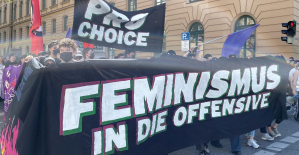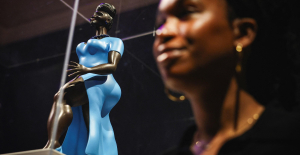Known for his eye patch and his fiery speeches, this former soldier will appear with four co-defendants for five weeks in a federal court located not far from the headquarters of Congress.
On January 6, 2021, they attacked the temple of American democracy with a thousand other supporters of Donald Trump, when elected officials certified the victory of Democrat Joe Biden in the presidential election.
Since this coup, more than 870 people have been arrested and around 100 have received prison sentences, including the perpetrators of violence against the police. But never, so far, has anyone had to defend themselves from "sedition".
The charge, which stems from a law passed after the Civil War to repress the last rebels in the South, "can be difficult to prove", explains Barbara McQuade, a former federal prosecutor now professor of law at the university of michigan.
Punishable by 20 years in prison, he implies having planned the use of force to overthrow the government or oppose one of its laws. It differs from insurrection, which has a more spontaneous character.
“There is also a connotation of disloyalty towards the country, not only against certain government actors”, notes Barbara McQuade. For her, however, the "motive is clear in this case, where the attack was clearly aimed at elected members of Congress".
This charge has been used very little: the last conviction for sedition came in 1998 against Islamist militants responsible for a bombing of the World Trade Center in New York five years earlier.
- Stock d'armes -
In the case of the assault on the Capitol, the prosecutors held him against only fifteen people, all members of two far-right paramilitary groups, the Oath Keepers and the Proud Boys.
Stewart Rhodes and four regional leaders of his militia -- Kelly Meggs, Thomas Caldwell, Jessica Watkins, Kenneth Harrelson -- are the first to be tried in this capacity.
Their trial will begin with the selection of twelve jurors from a panel of 120 citizens.
According to the indictment, "they conspired to oppose by force the legal transfer of presidential power."
Concretely, Stewart Rhodes is accused of having started to rally his troops in November 2020. "We are not going to get out of it without civil war", he wrote to them two days after the presidential election on an encrypted message.
In the following weeks, he, according to prosecutors, spent thousands of dollars buying night vision devices, weapons and ammunition, while his accomplices organized "unconventional combat" training and transport to Washington.
The carrying of weapons being strictly regulated in the capital, they are accused of having stored part of their arsenal in the nearby suburbs with the idea of using it later.
On January 6, helmeted and dressed in combat gear, they had marched towards the Capitol. Some had formed a column to break in and had turned back after receiving irritant gas.
Stewart Rhodes had remained a little further apart, armed with a radio, in order to dispense his orders. The Oath Keepers "stand ready to answer his call to arms", according to the indictment.
- Insurrection -
A former law graduate from Yale University, this 50-year-old with a winding career founded the Oath Keepers in 2009, recruiting former soldiers or police officers, initially to fight against the federal state deemed "oppressive".
Like other radical groups, this militia was seduced by Donald Trump's anti-elite rhetoric and fully endorsed the allegations of electoral fraud brandished - against all evidence - by the Republican.
During the trial, his lawyers will argue that Stewart Rhodes and his acolytes did not want to overthrow the government but that they expected the Republican billionaire to declare a state of insurrection, under an 1807 law that allows American presidents to mobilize certain armed forces in exceptional circumstances.
For the prosecutors, it is only a question of giving "a legal varnish" to their actions.

 Germany: abortions should be authorized up to 12 weeks, concludes a commission launched by Olaf Scholz
Germany: abortions should be authorized up to 12 weeks, concludes a commission launched by Olaf Scholz Knife attack in Australia: who are the two French heroes congratulated by Macron?
Knife attack in Australia: who are the two French heroes congratulated by Macron? Faced with an anxious Chinese student, Olaf Scholz assures that not everyone smokes cannabis in Germany
Faced with an anxious Chinese student, Olaf Scholz assures that not everyone smokes cannabis in Germany In the Solomon Islands, legislative elections crucial for security in the Pacific
In the Solomon Islands, legislative elections crucial for security in the Pacific Covid-19: everything you need to know about the new vaccination campaign which is starting
Covid-19: everything you need to know about the new vaccination campaign which is starting The best laptops of the moment boast artificial intelligence
The best laptops of the moment boast artificial intelligence Amazon invests 700 million in robotizing its warehouses in Europe
Amazon invests 700 million in robotizing its warehouses in Europe Inflation rises to 3.2% in March due to gasoline and electricity bills
Inflation rises to 3.2% in March due to gasoline and electricity bills Against drug trafficking, the mayor of Amsterdam advocates the regulation of cocaine
Against drug trafficking, the mayor of Amsterdam advocates the regulation of cocaine Hachette Livre removes Isabelle Saporta from management of Fayard
Hachette Livre removes Isabelle Saporta from management of Fayard Where is the MSC Aries, the ship boarded by Iran?
Where is the MSC Aries, the ship boarded by Iran? Denis Olivennes at Le Figaro: “CMI France discusses with Natacha Polony the future of Marianne”
Denis Olivennes at Le Figaro: “CMI France discusses with Natacha Polony the future of Marianne” 2024 Candidates Chess Tournament: Relive the Crucial Nepo-Gukesh Game
2024 Candidates Chess Tournament: Relive the Crucial Nepo-Gukesh Game Borgo, by Stéphane Demoustier: locked outside
Borgo, by Stéphane Demoustier: locked outside Release of hostages and immediate ceasefire: at the Venice Biennale, the Israeli pavilion resonates with Gaza
Release of hostages and immediate ceasefire: at the Venice Biennale, the Israeli pavilion resonates with Gaza Two Russian artists declared “terrorists and extremists” because of a play
Two Russian artists declared “terrorists and extremists” because of a play Skoda Kodiaq 2024: a 'beast' plug-in hybrid SUV
Skoda Kodiaq 2024: a 'beast' plug-in hybrid SUV Tesla launches a new Model Y with 600 km of autonomy at a "more accessible price"
Tesla launches a new Model Y with 600 km of autonomy at a "more accessible price" The 10 best-selling cars in March 2024 in Spain: sales fall due to Easter
The 10 best-selling cars in March 2024 in Spain: sales fall due to Easter A private jet company buys more than 100 flying cars
A private jet company buys more than 100 flying cars This is how housing prices have changed in Spain in the last decade
This is how housing prices have changed in Spain in the last decade The home mortgage firm drops 10% in January and interest soars to 3.46%
The home mortgage firm drops 10% in January and interest soars to 3.46% The jewel of the Rocío de Nagüeles urbanization: a dream villa in Marbella
The jewel of the Rocío de Nagüeles urbanization: a dream villa in Marbella Rental prices grow by 7.3% in February: where does it go up and where does it go down?
Rental prices grow by 7.3% in February: where does it go up and where does it go down? Europeans: the schedule of debates to follow between now and June 9
Europeans: the schedule of debates to follow between now and June 9 Europeans: “In France, there is a left and there is a right,” assures Bellamy
Europeans: “In France, there is a left and there is a right,” assures Bellamy During the night of the economy, the right points out the budgetary flaws of the macronie
During the night of the economy, the right points out the budgetary flaws of the macronie Europeans: Glucksmann denounces “Emmanuel Macron’s failure” in the face of Bardella’s success
Europeans: Glucksmann denounces “Emmanuel Macron’s failure” in the face of Bardella’s success These French cities that will boycott the World Cup in Qatar
These French cities that will boycott the World Cup in Qatar Bundesliga: Naby Keita suspended by Werder Bremen until the end of the season
Bundesliga: Naby Keita suspended by Werder Bremen until the end of the season Euro 2024: the Blues reveal their opponents for friendlies in June
Euro 2024: the Blues reveal their opponents for friendlies in June Cycling: De Marchi wins the 2nd stage of the Tour of the Alps
Cycling: De Marchi wins the 2nd stage of the Tour of the Alps Paris Olympics 2024: Joris Daudet (BMX) candidate to be French flag bearer
Paris Olympics 2024: Joris Daudet (BMX) candidate to be French flag bearer


















